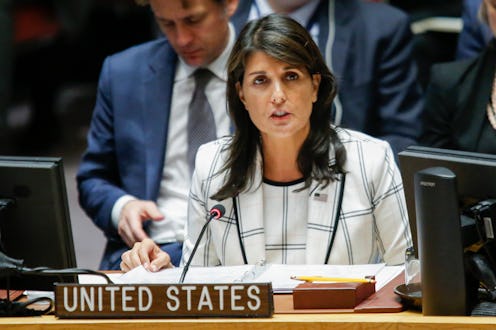
It looks like America is out. On Tuesday, the U.S. withdrew from the UN Human Rights Council, after prior reports indicated that President Trump's administration would do so. CNN reported that rumors of the withdrawal on early Tuesday had already elicited outcry from non-governmental organizations that learned about the potential withdrawal.
On Tuesday, Secretary of State Mike Pompeo delivered the announcement along with United States Ambassador to the United Nations, Nikki Haley, in a joint address. Their speech had harsh words for the council. Haley called the body "hypocritical and self-serving," and criticized it as "a protector of human right abusers and cesspool of political bias." She also said the UN Human Rights Council was "not worthy of its name."
In 2017, Haley warned the council that the U.S. would pull out if there were no substantial reforms. She criticized the United Nations Human Rights Council for supposed anti-Israel bias. "For our part, the United States will not sit quietly while this body, supposedly dedicated to human rights, continues to damage the cause of human rights," she said. "In the end, no speech and no structural reforms will save the members of the Human Rights Council from themselves."
Prior to the withdrawal, according to Bloomberg, a spokesperson from the United Nations said that the body was not aware that the United States would remove itself from the council.
The United States' at-will removal from the council comes at a particularly controversial moment in history. With Donald Trump's aggressive "zero tolerance" immigration policy has broken migrant families up, tearing children away from their parents.
The policy has elicited strong criticism not just from lawmakers in the U.S. (including from the president's own party), it has also been ripped by the United Nations. The organization’s high commissioner for human rights, Zeid Ra’ad Al Hussein, said that he was "deeply concerned by recently adopted policies which punish children for their parents’ actions." He added, "The thought that any State would seek to deter parents by inflicting such abuse on children is unconscionable."
Days before the Tuesday announcement, outrage over migrant children being put in detention centers reached a fever pitch; Trump has defended his administration's family separation policy by blaming Democrats for it.
What does it mean now that the United States has pulled out of the United Nations Human Rights Council? The 47-member council, which was first created in 2006 and is headquartered in Geneva, carries significant meaning when it comes to protecting human rights, maintaining equal global relations and accountability, and peace-building.
With America's withdrawal from the council, apprehension about American commitment to a peaceful world may rise. Some observers in the global community could interpret this move as an unapologetic rejection of international cooperation and collaboration. After all, not once in the 12 years of its existence has a member of the United Nations Human Rights Council voluntarily removed itself from the council body. Already, observers worry the United States is taking on an isolationist approach to foreign policy.
The only country to have been suspended from the circle was Libya in 2011. During the Arab Spring, while under the rule of former leader Muammar Gaddafi, the country was removed from the council with the United Nations General Assembly's final confirmation. Only the assembly has the power to kick a country out of the council.
Now with United States voluntarily stepping out of the United Nations Human Rights Council, the country may have tarnished relations with the global village. On top of that, America has also relinquished its voting power. From here on out, it will merely sit as an observer.